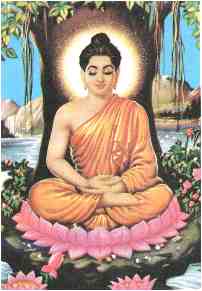
| |
 |
Buddhism - The Path |
 |
Buddhism is one of the world’s major spiritual paths. It is based on the teachings of Siddhartha
Gautama, known as The Buddha. According to the Buddhist teachings, Siddhartha was the first human to attain enlightenment, after which he taught others how to attain it.
The emphasis in Buddhism is on seeing, knowing and understanding Truth, leading to Supreme Enlightenment. This requires that each individual assume responsibility for his or her own emancipation from anguish and suffering. There are no dogmas, creeds, rites, ceremonies, sacrifices, or penances in Buddhism.

Buddhism may be described as the Middle Path because it holds the center road between the extremes of worldly self-indulgence and the mortifying existence of the strict ascetic.
Known as the Path of Escape, its goal is to end all anguish. Anguish in this orientation is defined as “birth, suffering, pain, sorrow, sickness, disease, old age, decay, death, grief, despair, poverty, evil, lamentations, woe, tribulations, misfortune, war, insanity, hunger, unfulfilled wants, unfulfilled basic needs, association with the unwanted, disassociation from the wanted, and is what is unstable and uncontrollable.”

The Eightfold Path
 |
Right Views; Right Understanding. This first stage of the Eightfold Path is composed of the Four Noble Truths: 1) All is suffering (dukkha); 2) Suffering is caused by desire; 3) If one can eliminate desire, suffering can be eliminated; 4) The Noble Eight-fold Path can eliminate desire. |
 |
Right Intent; Right Thinking. One must aspire to realization of Perfect Wisdom, the Ultimate True Permanent Reality. This requires that one will abstain from all evil thoughts, do away with all cravings, and renounce all manifestations of all “created realities”, which are considered to be make-believe. To achieve this, one must practice dispassion, total detachment, absolute renunciation and self-surrender. |
 |
Right Speech. One must abstain from lying, perjury, and evil and frivolous speech. It is important to engage in permanent and real speech that leads to Nirvana. |
 |
Right Conduct; Right Action. One must abstain from killing of all creatures, from stealing, from sensual and sexual misconduct, from all evil acts, and from all forms of intoxication. |
 |
Right Livelihood; Right Living. One must abstain from all evil ways of living and livelihood. |
 |
Right Effort. One must destroy all evil states of mind that already exist and keep new evil states of mind from arising. One must maintain and develop good states of mind that already exist and create new states of mind that espouse loving kindness, compassion and pity for ALL creatures. One will develop sympathetic joy and equanimity. |
 |
Right Mindfulness. One must perceive the following as impermanent, ill and selfless: Body, Feelings, Perception, Mind, Consciousness, Thought, Mental States, Mental Objects and Mental Activity. This requires that one will remain aloof from both the pleasures and the pains that arise from the senses and sensuality. |
 |
Right Concentration. One will remain aloof from the world, from evil states, from all sensuality, and will dwell in solitude, seclusion and self-resolution in order to develop through meditation one-pointedness of Mind. |
|
Copyright
1999 - 2010 All rights reserved |
||
|
|